
Top 7 Glyphosate Questions in 2019, Truthfully Answered
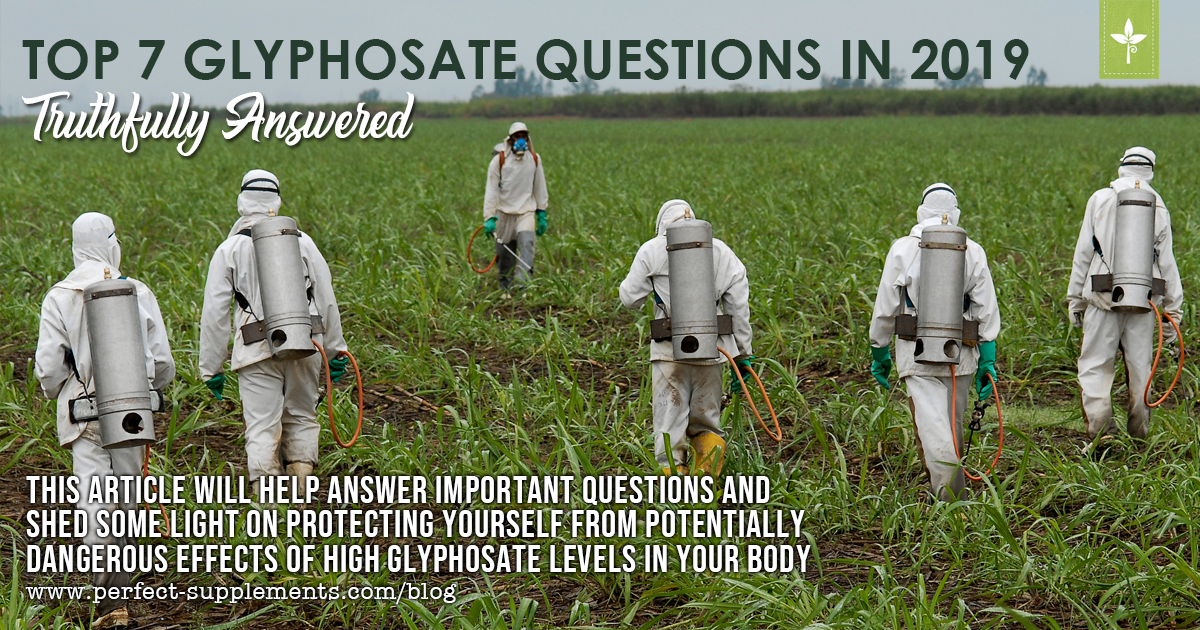
Here at Perfect Supplements there is no question or doubt in our minds that harmful chemicals should be actively avoided as much as possible in the things that we put in, around and/or on our bodies. All-natural is always the best, safest, and most beneficial for the body- heck it’s our company tagline! There are many reasons why we advocate against the use of various chemicals in and on our foods, supplements, skin/beauty products, etc … This article focuses on 7 common questions we hear about one of the most current and biggest game changing chemicals out there today:
GLYPHOSATE
Insert DunDun Duuuun sound here. 7 frequently asked questions we hear asked about Glyphosate are:
- What exactly is it?
- Where did it come from?
- How dangerous is it?
- Where is it found?
- Is it avoidable?
- Yikes, is it in my body?
- How do I get it out!?
This article will help answer these important questions and shed some light on what can be done to protect yourself from the potentially dangerous effects of high Glyphosate levels in your body. This image is displayed at our local yoga/detox studio. It gives me a chuckle but at the same time, I find it truthfully scary and sad.
For more in-depth information resources used are included as links in the article.
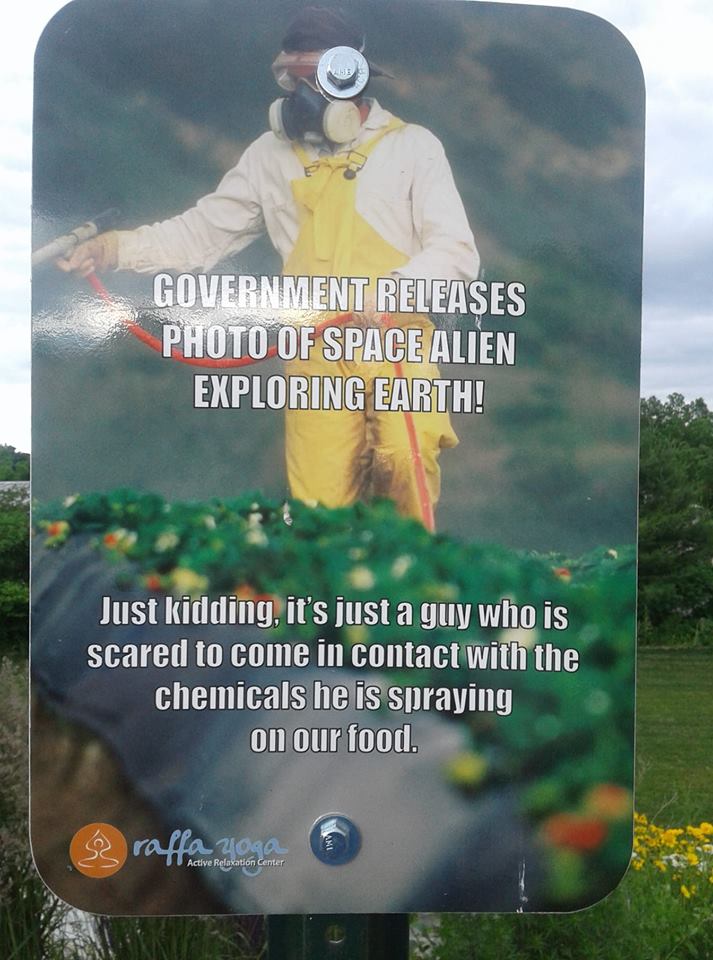
#1 What Is Glyphosate?
Currently, Glyphosate is the #1 active ingredient in the most widely used herbicide/pesticide today called Round-Up. Round-Up is commonly used in countries around the world for large scale agricultural farming and smaller scale yard and garden maintenance.
#2 Where did Glyphosate come from?
In 1961 Glyphosate was originally formulated and patented as descaling and chelating agent used to clean out calcium and other mineral deposits in pipes and boilers of residential and commercial hot water systems. In 1970 a scientist working with Monsanto company discovered it’s use as a herbicide/weedkiller and 4 years later Round-Up was introduced to the market. In 1996 Monsanto created Genetically Modified Seeds that would survive massive amounts of the weed killer and those seeds now make up alarmingly high percentage of all US agricultural crops.
Fun fact: In 2010 it was patented as an antibiotic used against malaria but that has nothing to do with the topic of this article. It does show, however, how strong of an effect this chemical can have on living things.
#3 Is Glyphosate Dangerous?
The Great Debate …
Tad bit of NOT BORING history: Beginning in the 1950s, biologist Rachel Carson began drawing attention to the dangers of pesticides (specifically DDT) with her book titled Silent Spring that was met with high regard from the scientific community and undoubtedly not high regard from various chemical companies. However, her research led to a nationwide ban on DDT for agricultural uses and her findings inspired a movement that soon led to the implementations of the U.S. Environmental Protection Agency (U.S. EPA).
Fast forward to today, it is now wondered if Glyphosate, much like DDT, is just as dangerous and making people sick? Some argue no, some argue Yes. Does it cause the C word? Some say yes, some say no. Does it cause serious mental health conditions? Some say yes, so some say no. Is it harming our environment? Some say yes and can you guess it? Some say no. And I bet you can also guess that it is mostly scientists and educators on one side, and large chemical and produce companies on the other.
Fun Fact: The only legal use at this time for the already banned chemical DDT is to kill mosquitos carrying the malaria virus. That seems familiar.
A Turning Point …
A huge turning point in the ongoing safety debate on Glyphosate was a court case filed in 2016 by a man who strongly believed the weed killer Round-up was the cause of his incurable illness. The courts ruled in his favor and he was awarded a large sum of money but he is not expected to live past 2019 according to doctors.
The Scariest Part …
It is up to the individual to do the research and decide which side of this ongoing debate they would advocate for. One side of the debate is that certain levels of dangerous chemicals are considered “safe enough” and the “benefits” of them out-weigh the negatives. The other side is the question why would someone want to take the risk of ingesting something on a daily basis that is designed to kill things?
The scariest part is, do we even have a choice anymore?
#4 Where is Glyphosate found?
The sad news is, Glyphosate has been widely used for so long that it is inevitably being found everywhere.
- It is found in most food and drinks
- It is found in beers and wines (even organic)
- It is found in Cereals, Granola Bars, etc …
- It is found in children’s vaccines
- It has been found in breast milk
This list could go on and on 🙁
#5 Is There Glyphosate In My Body?
Do you eat? Do you drink? Do you Breathe? Then sorry, most likely yes. A recent study showed that 93% of Americans tested were found to have Glyphosate in their urine and another study tracked individuals from from 1993 to 2016 and found that their levels increased by 500% during that time. There is good news however! There are tests available to determine how much is currently in your body, effective ways to avoid exposure and ways to lower your levels.
#6 Is Glyphosate Avoidable?
Unless you move to a far away undiscovered planet I believe it is safe to say Glyphosate is not 100% avoidable, but there are many who are taking actions help limit global exposure.
- Countries are banning it
- U.S. cities are banning or limiting the us of it
- Stores are banning it
- There are MANY large organizations forming against it like Millions Against Monsanto, USPIR.ORG and Mom’s Across America
- There is now Glyphosate specific testing available for products
Large scale banning of Glyphosate is a start, but it may not be enough. There are other simple steps that can be taken to reduce your exposure to Glyphosate.
- Advocate. Don’t use Round-up. Ask your neighbors, family members, friends, perfect strangers not to as well.
- Find local farms and encourage them not to use Round-up and purchase from the ones who don’t.
- Shop organic because you can’t simply wash off the chemicals. Most herbicides, like glyphosate, penetrate into the plant and fruit itself and does not just sit on top of the skin.
- Avoid the “dirty dozen“and the most heavily/frequently sprayed crops types.
- Look for the “Glyphosate Residue Free” label, a new certification for packaged foods.
- Ask companies for verification documents that their products are pesticide free.
- Test your water and other surrounding elements.
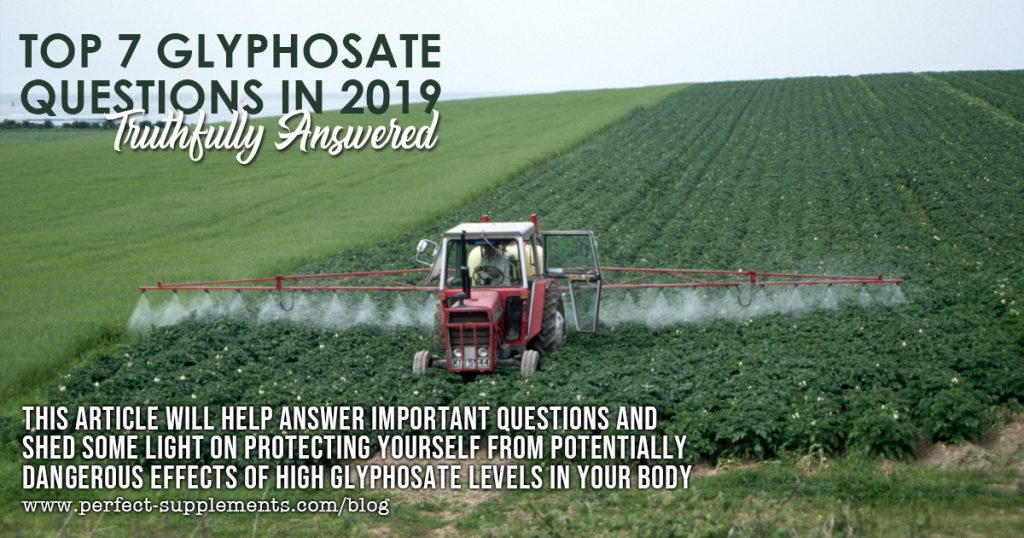
#7 What Can I do About Glyphosate Already in My Body?
- Eat Organic -A recent study showed a massive reduction of Glyphosate levels found in subjects’ bodies after only one week of eating organic!
- Detox- Based on the scientific studies to-date, there are a number of natural foods and supplements that have shown positive results in detoxifying and reducing the toxic effects of Glyphosate exposure. Not only can you detox your body, but you can detox your home to limit exposure.
- Test for and manage your levels – there is urine testing and hair testing methods currently available.
Check out our related blog: 3 Steps to Lower Glyphosate Levels today.
We hope you have found this information useful. Here at Perfect Supplements we regularly test our products for pesticides/ herbicides/ hormones/ etc. and strongly advocate for a cleaner, less toxic world however we can. Please let us know if you have any other questions about this topic or have any other interesting information about it you would like to share with us in the comments section below!
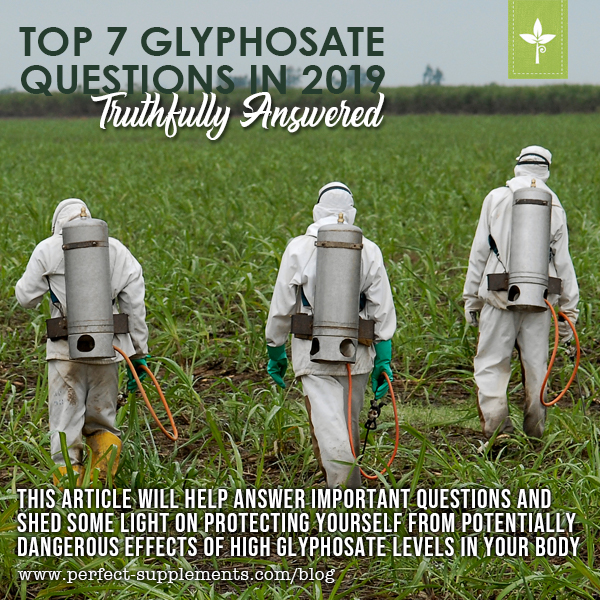
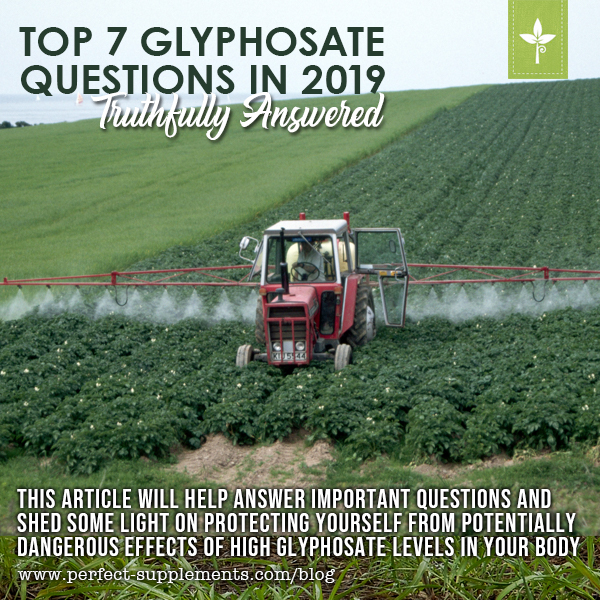

Comments are disabled for this post